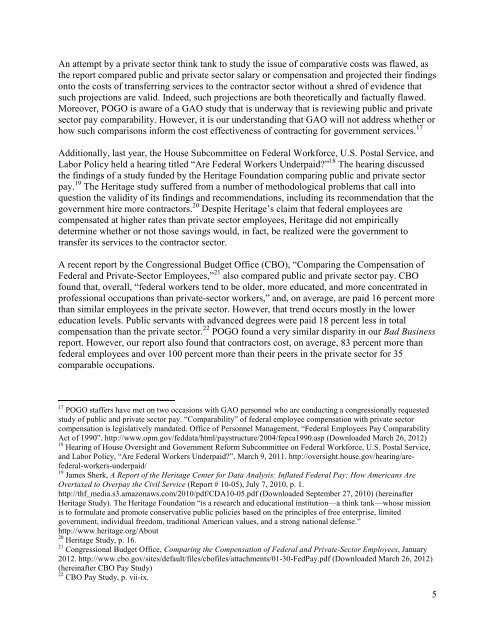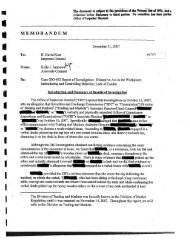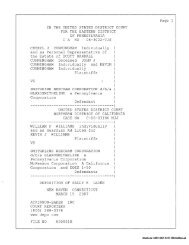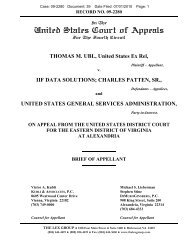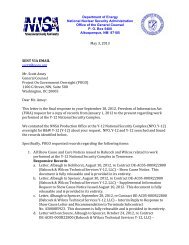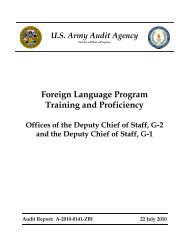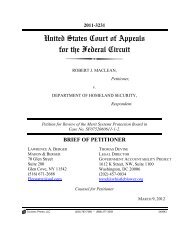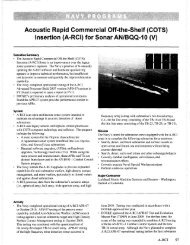SA McCaskill Cost Hearing Final 03 29 12 - U.S. Senate Homeland ...
SA McCaskill Cost Hearing Final 03 29 12 - U.S. Senate Homeland ...
SA McCaskill Cost Hearing Final 03 29 12 - U.S. Senate Homeland ...
Create successful ePaper yourself
Turn your PDF publications into a flip-book with our unique Google optimized e-Paper software.
An attempt by a private sector think tank to study the issue of comparative costs was flawed, as<br />
the report compared public and private sector salary or compensation and projected their findings<br />
onto the costs of transferring services to the contractor sector without a shred of evidence that<br />
such projections are valid. Indeed, such projections are both theoretically and factually flawed.<br />
Moreover, POGO is aware of a GAO study that is underway that is reviewing public and private<br />
sector pay comparability. However, it is our understanding that GAO will not address whether or<br />
how such comparisons inform the cost effectiveness of contracting for government services. 17<br />
Additionally, last year, the House Subcommittee on Federal Workforce, U.S. Postal Service, and<br />
Labor Policy held a hearing titled “Are Federal Workers Underpaid?” 18 The hearing discussed<br />
the findings of a study funded by the Heritage Foundation comparing public and private sector<br />
pay. 19 The Heritage study suffered from a number of methodological problems that call into<br />
question the validity of its findings and recommendations, including its recommendation that the<br />
government hire more contractors. 20 Despite Heritage’s claim that federal employees are<br />
compensated at higher rates than private sector employees, Heritage did not empirically<br />
determine whether or not those savings would, in fact, be realized were the government to<br />
transfer its services to the contractor sector.<br />
A recent report by the Congressional Budget Office (CBO), “Comparing the Compensation of<br />
Federal and Private-Sector Employees,” 21 also compared public and private sector pay. CBO<br />
found that, overall, “federal workers tend to be older, more educated, and more concentrated in<br />
professional occupations than private-sector workers,” and, on average, are paid 16 percent more<br />
than similar employees in the private sector. However, that trend occurs mostly in the lower<br />
education levels. Public servants with advanced degrees were paid 18 percent less in total<br />
compensation than the private sector. 22 POGO found a very similar disparity in our Bad Business<br />
report. However, our report also found that contractors cost, on average, 83 percent more than<br />
federal employees and over 100 percent more than their peers in the private sector for 35<br />
comparable occupations.<br />
17 POGO staffers have met on two occasions with GAO personnel who are conducting a congressionally requested<br />
study of public and private sector pay. “Comparability” of federal employee compensation with private sector<br />
compensation is legislatively mandated. Office of Personnel Management, “Federal Employees Pay Comparability<br />
Act of 1990”. http://www.opm.gov/feddata/html/paystructure/2004/fepca1990.asp (Downloaded March 26, 20<strong>12</strong>)<br />
18 <strong>Hearing</strong> of House Oversight and Government Reform Subcommittee on Federal Workforce, U.S. Postal Service,<br />
and Labor Policy, “Are Federal Workers Underpaid?”, March 9, 2011. http://oversight.house.gov/hearing/arefederal-workers-underpaid/<br />
19 James Sherk, A Report of the Heritage Center for Data Analysis: Inflated Federal Pay: How Americans Are<br />
Overtaxed to Overpay the Civil Service (Report # 10-05), July 7, 2010, p. 1.<br />
http://thf_media.s3.amazonaws.com/2010/pdf/CDA10-05.pdf (Downloaded September 27, 2010) (hereinafter<br />
Heritage Study). The Heritage Foundation “is a research and educational institution—a think tank—whose mission<br />
is to formulate and promote conservative public policies based on the principles of free enterprise, limited<br />
government, individual freedom, traditional American values, and a strong national defense.”<br />
http://www.heritage.org/About<br />
20 Heritage Study, p. 16.<br />
21 Congressional Budget Office, Comparing the Compensation of Federal and Private-Sector Employees, January<br />
20<strong>12</strong>. http://www.cbo.gov/sites/default/files/cbofiles/attachments/01-30-FedPay.pdf (Downloaded March 26, 20<strong>12</strong>)<br />
(hereinafter CBO Pay Study)<br />
22 CBO Pay Study, p. vii-ix.<br />
5


